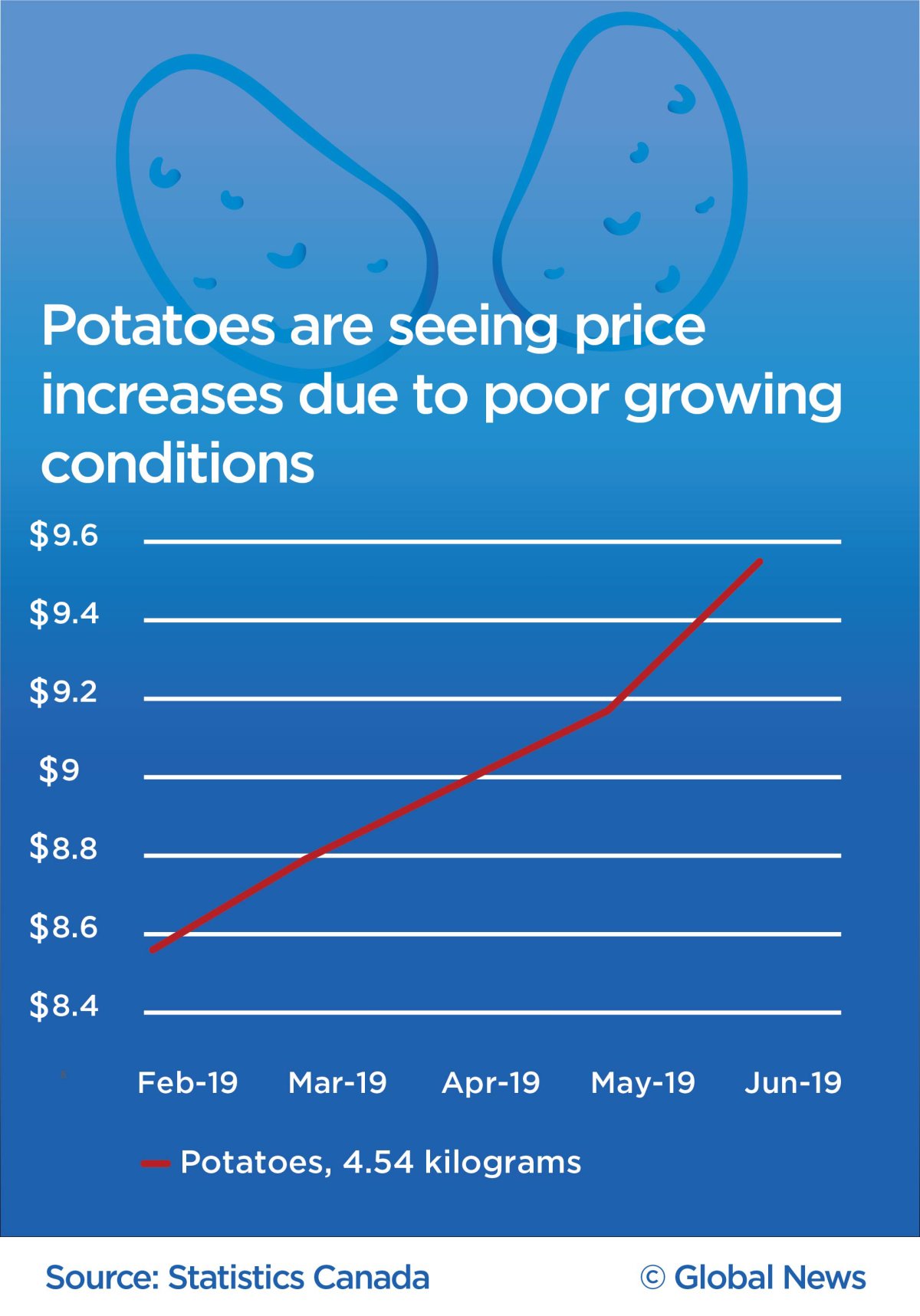Hold off on that carrot cake. Canadians are paying about 30 per cent more for their carrots than they were this past February, according to data from Statistics Canada.

And the same might be true for a number of root vegetables, including potatoes and onions, which have gone up in price respectively by 10 and 20 per cent each.
Who is most impacted?
Food banks and the Canadians who access them, are prime examples of people who will be most significantly affected, said Amanda Colella-King, interim director of Feed Ontario, formerly the Association of Ontario Food Bank.
She noted that 90 per cent of individuals who access food banks are already spending almost three-quarters of their income on housing. Therefore, when food prices increase — even marginally — they may have trouble making ends meet.
“As a result, low-income individuals may need to access a food bank throughout the month, or may need to access the food bank more frequently,” she said in a statement.
Furthermore, an additional $0.40 per kilogram of carrots can strain a food bank’s resources, as many are required to purchase additional food to meet rising needs.
- Budget 2024 failed to spark ‘political reboot’ for Liberals, polling suggests
- Train goes up in flames while rolling through London, Ont. Here’s what we know
- Peel police chief met Sri Lankan officer a court says ‘participated’ in torture
- Wrong remains sent to ‘exhausted’ Canadian family after death on Cuba vacation
“When food prices increase, it can put additional stress on the food bank’s resources and ability to adequately serve the needs of their community. This is particularly true, with both rising demands on the food banks, and the rising cost of operating the food bank,” she added.
Why are prices going up?
According to a number of experts in produce supply chains, this likely has to do with excessive rain during harvest season, which has impacted supply.
“Late last year we had a lot of rain and weather impacting the main areas where we grow. Root vegetables, like onions, like potatoes, like carrots in areas such as New Brunswick and also in areas of the U.S.,” explained Simon Somogyi, Chair of the Business School of Hospitality and Management at the University of Guelph.
The price of carrots has gone up by $0.61 per kilogram since February 2019, while the price of onions has gone up by $0.51 per kilogram and the price of potatoes has gone up by $0.99 per kilogram.
He adds that food prices, in particular, food that “comes out of the ground” are subject to weather conditions.
“In this case, in late 2018 when the harvest is about to happen, some significant weather events in New Brunswick in eastern Canada which decreases the supply of root vegetables,” he continued.
As Canada also imports produce from the United States, Somogyi notes that there have been “noticeable slowdowns at the border, which are also impacting the supply of vegetables and fruit into Canada,” he said. “In many cases, they’re being stopped from getting into Canada because the U.S. border protection services, particularly the Mexico-U.S. border, have been very slow to process people and trucks because they’re concerned about illegal immigrants.”
Excessive rain impacting Canada’s growing conditions
According to a 2015 Government of Canada report, Eastern Canada covers almost 10 per cent of the distribution of carrot production across Canada.
On the other hand, Ontario and Quebec alone make up a combined 76 per cent of carrot production. In 2019 however, the consistently wet weather has set farming schedules in both regions back by several weeks, and these conditions don’t seem to be improving anytime soon.
David Whittington, a farmer from the Kawarthas in Ontario, said in an interview with Global News a few months ago that this is the “wettest summer in 150 years.”
WATCH: Alberta producers react to report suggesting meat prices to drop in 2019 (2018)

“No matter how old you are, we haven’t seen weather like this,” Whittington told Global News last week.
In May, 2019, Eastern Canadian farmers warned Canadians that their harvest would be in short supply this year, farmers told Global News .
Due to the rain, they were weeks behind getting into the fields for spring planting. Come June, the conditions hadn’t improved.
“We should be eating peas by now and it’s not even close,” Christian Michaud, who owns Michaud Farms in Bouctouche, told Global News earlier this month.
Nova Scotian farmers dealt with similar conditions throughout the latter half of 2018 and the first half of 2019.
What other factors impact the price of Canadian produce?
Marc Wulfraat, the head of the supply chain and logistics consulting group MWVPL, states that “nine times out of ten, the reason for a price increase is a supply-demand curve,” meaning that demand exceeds supply.
“So if supply is short for some reason — it could be weather, it could be just a bad year for farming or agriculture in general, a lot of rain — there is a shortage of supply. If the demand remains neutral, then you have a price increase as a result, Wulfraat explained.
Other factors could potentially impact the price of produce as well, including exchange rates between the Canadian and U.S. dollars and the cost of logistics (moving produce from one location to another).
In this case, given that there’s been little volatility in the exchange rate as of late and seeing as long-haul trucking costs are beginning to come down, the weather is the likely culprit, he notes.
— With files from Shelley Steeves and Jake Jeffrey






Comments